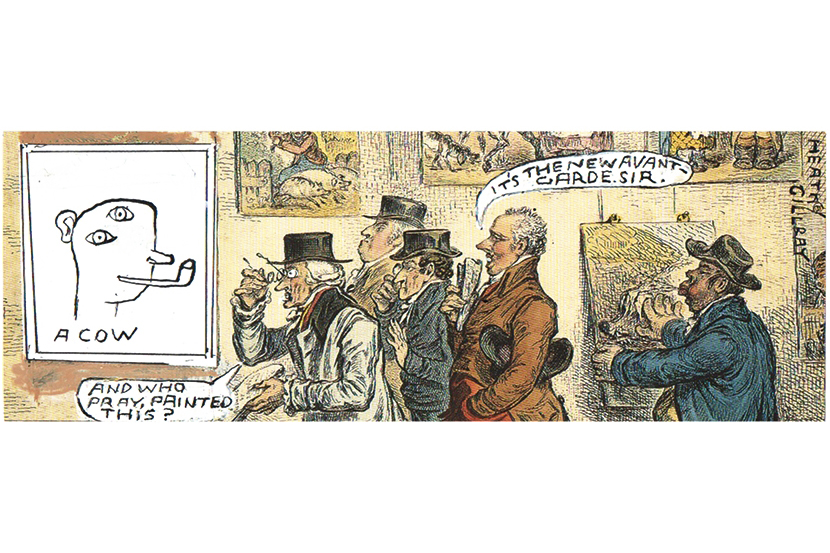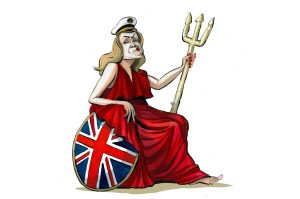I’m blessed by the fact that I live almost smack-bang in the middle of old London, a pebble’s toe punt from St Paul’s cathedral. Being an aficionado of Charles Dickens and J.B. Priestley, I’ve been able to wander along empty streets and alleys that have been immortalized in such novels as Angel Pavement and Bleak House. When I’m walking around the yards and courts at the back of the Bank of England, I can imagine the nefarious Mr Golspie darting round a corner with an enigmatic grin of triumph on his conniving, pugnacious moosh. Kicking a stone down a street for as long as possible has been a rediscovered pleasure to me over the past year. During the most deserted period of the first lockdown, I dribbled a cracked flint pebble up the middle of a deserted Fleet Street from Ludgate Hill to the Royal Courts of Justice without encountering a single vehicle. At one point I hit a bin with a resounding crack that was as joyful as the sound of morning birdsong. I felt like I was eight years old again.
Some weeks ago, I was quarantining in a schloss near Frankfurt. Since I arrived at night, all I experienced of the hotel before confinement in my room was a looming gothic silhouette and an eerily amicable welcome by an immaculately dressed greeter. The hotel doubled up as the set of Spencer, a feature film about the last Christmas Princess Diana spent at Sandringham before her marriage ended. I had a beautifully appointed two-room suite/cell with the occasional welcome room-service visits from staff who were so surreally charming it was as if they were out of cut scenes from The Shining. One positive was that I’d been supplied with a toaster, a kettle, a bread knife and bananas. I brought my own tea bags so I could normalize my wait in isolation by having my regular breakfast of bananas on toast with tea, while listening to the sounds of the German crew setting up lights and props.
I was alone in this room — which felt horribly unusual. For the past 20 years, my wife Shane and I have been joined at the hip and wherever I go, she goes. It has become a contractual obligation for whatever job I do. One of the benefits of having kids young is you can do things like this once they’ve flown the nest. This time, however, for various reasons I’d traveled before her. She was about to join me, but then the German government called in a travel ban from the UK. We got through it by behaving like a pair of separated teenage lovers, FaceTiming each other at least six times a day. Our calls always ended in an hour session at night doing the Telegraph crossword…that’s probably where the teenage lover comparison falters.
After two months of filming in the schloss, then Munster and finally a deserted, blizzard-blasted Berlin, I was home and we were reunited, which was a blessed joy. However, the half-finished painting on the easel in my studio was still there. Two years ago, the Pontone Gallery in the West End offered me my own solo show, to my huge excitement and deep horror. The offer came after the owner, Dominic Pontone, saw a selection of my paintings in the Lowry Gallery in Salford. They were part of a small exhibition about the making of the film Mrs Lowry & Son. Life has imitated art: having played J.M.W. Turner and L.S. Lowry on screen, I took up the pigments and brushes myself and began painting like an artist called T.L. Spall. This was the fault of Tim Wright, my brilliant art teacher, who I’d been hooked up with two years before making the film Mr Turner. He gave me an art foundation crash course. The most effective and liberating thing he taught me was just to get on and do it. This I had done: I completed 19 40 x 30in canvases over a seven-month grind during the first two lockdowns. The goading acrylic bastard that greeted me on my return from Germany was slightly bigger at 48 x 36.
Inspiration to finish it came during a walk through the middle of the Bunhill Fields cemetery near Old Street. William Blake, one of my favorites, is there as well as many other free-thinking spiritual geniuses. As I approached John Bunyan’s tomb, I gave a hefty punt to a flint lying on the ground. It hit the railings, bounced on to a tree and landed, splitting a dry dog turd in half. I had a miraculous and liberating epiphany. I went home and with eight brush strokes finished the painting. It’s now the 20th piece in my show.
This article was originally published in The Spectator’s UK magazine. Subscribe to the World edition here.


















